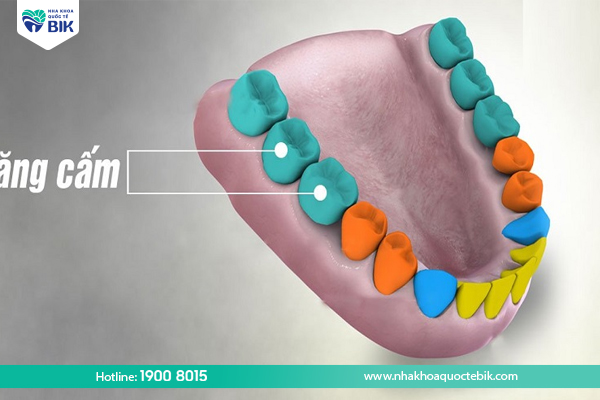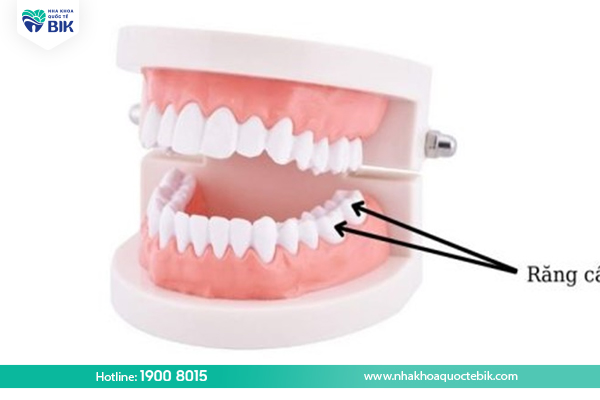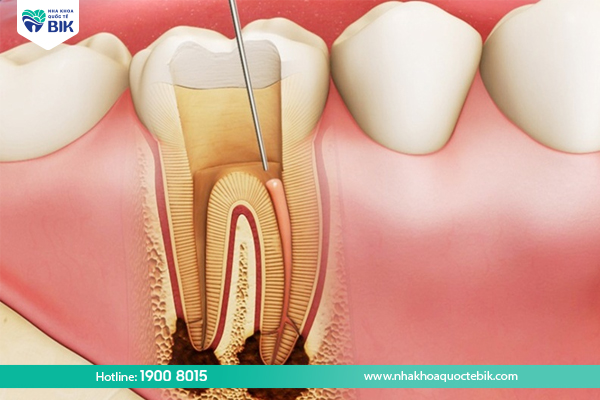Molars are teeth that grow in a fixed position on the jaw, play an important role in chewing food and creating a beautiful smile. Molars and baby teeth are completely different in number and size. However, many people often confuse molars and baby teeth, asking the question: will molars be replaced? If you want to know the answer, read the following article from BIK International Dental Clinic!

What are molars?
Before learning about molars, you need to know that each adult has a total of 32 teeth, divided into 4 groups as follows:
- Incisor group: Includes 8 teeth in positions 1 and 2.
- Canine group: Includes 4 teeth in position 3.
- Premolar group: Includes 8 teeth in positions 4 and 5.
- Molar group: Includes 12 teeth in positions 6, 7 and 8.

Molars belong to the molar group, located at positions 6 and 7. Adults have a total of 8 molars, growing evenly in both jaws. Molars are like other teeth, consisting of 3 layers: pulp, dentin and outer enamel.
Molars in the upper jaw have 3 roots, while those in the lower jaw have 2 roots. The roots are not straight but slightly curved. However, there are also some cases where molars have more or less than 1-2 roots. The tooth body is large, the chewing surface is wide, and there are deep grooves, so molars play an important role in the chewing function of the jaw.
Do molars grow?
Molars belong to the group of permanent teeth that only grow once and are never replaced if lost. Of the 32 teeth, only 20 can replace the baby teeth on the jaw, including 8 incisors, 4 canines and 8 premolars. The remaining 12 teeth belong to the molar group, including molars number 6 and number 7, which are permanent teeth and cannot replace any baby teeth. This means that these teeth only grow once.
Therefore, the loss of molars number 6 and number 7 will affect chewing function, causing difficulty in eating and drinking, and loss of appetite. Long-term tooth loss also causes jawbone atrophy, seriously affecting oral and overall health.
In addition, the area of molar teeth number 6 and number 7 has many blood vessels and nerves, extracting this tooth can be dangerous and should only be done when the damage is too severe and cannot be restored. The tooth extraction process also needs to be performed by a specialist with high skills.
Therefore, children cannot replace their molars. Parents need to be aware of the importance of this tooth and take care of them from an early age.

How to relieve pain when molars grow
When children grow molars, they will feel uncomfortable but cannot express it in words. Here are some methods you can apply when your baby is teething:
- Massage the gums: Use sterile gauze to remove bacteria on the gums to help reduce pain and bacteria.
- Add cool water: Cool water helps shrink the gums and quickly relieve pain.
- Wipe drool: Clean drool to avoid irritation of the mucous membrane.
- Choose food: Feed your baby soft foods such as porridge, smoothies or milk to limit gum damage.

Common diseases of molars
Molars are considered the main tool for chewing food, because the tooth surface is in direct contact with food, so they are often prone to oral health problems such as:…
Tooth decay
Tooth decay most often occurs in teeth number 6 and 7 due to their large chewing surface, which is prone to plaque and food debris. If you do not take proper care of your teeth, bacteria that cause tooth decay will have the opportunity to develop.
In addition, when wisdom teeth grow crookedly or improperly, it can put pressure on tooth number 7 and lead to tooth decay.
Tooth pulpitis
Chewing food can cause cracks in the molars, allowing bacteria to enter and cause pulpitis, causing toothache. If not treated promptly, the teeth will gradually deteriorate and lead to tooth loss.

Periodontitis
Gingivitis is an inflammation that occurs around the teeth, affecting the structure of the teeth. When this condition persists, the jawbone will be destroyed and cause the teeth to loosen. Some common signs of gingivitis include swollen gums, pain, discomfort, and damage to the nerves around the teeth.
Tooth loss, jaw bone loss
If not detected and treated promptly, the problems with molars mentioned above can damage the teeth, even leading to the risk of tooth loss. This affects the chewing ability of the jaw and causes cavities to appear throughout the jaw.
How to properly clean molars
Molars are teeth that only grow once and play an important role in chewing food, so they need to be properly cared for and cleaned to avoid oral health problems. Especially in children, caring for molars is even more necessary.
To protect the health of this tooth, you need to follow these rules:
- Brush your teeth twice a day with a soft-bristled toothbrush and fluoride toothpaste to prevent tooth decay.
- Use dental floss and mouthwash to effectively remove plaque and leftover food.
- Follow a healthy diet, adding calcium and vitamins to your daily diet. Limit sweets and carbonated drinks.
- If you have a habit of grinding your teeth while sleeping, use a mouth guard.
- Visit the dentist every 6 months to clean your teeth and detect oral problems early.
Thus, through this article, you have understood whether molars are replaced, the importance of proper molar care and the need to regularly check at the dentist to avoid unwanted problems. Don’t forget to contact BIK International Dental Clinic via hotline: 1900 8015 to make an appointment or receive free advice on oral health!


















